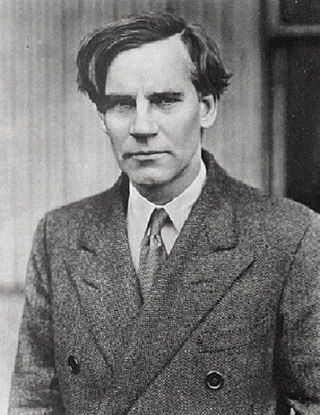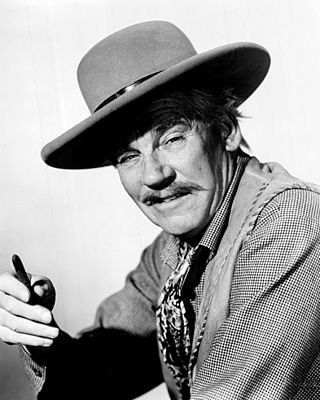Walter Huston
Canadian actor and singer (1884–1950) From Wikipedia, the free encyclopedia
Walter Thomas Huston (/ˈhjuːstən/ ⓘ HEW-stən; April 6, 1883[1][2][3][4] or 1884[5][6][7][8] – April 7, 1950) was a Canadian actor and singer. Huston won the Academy Award for Best Supporting Actor for his role in The Treasure of the Sierra Madre, directed by his son John Huston. He is the patriarch of the four generations of the Huston acting family, including his son John, grandchildren Anjelica Huston and Danny Huston, as well as great-grandchild Jack Huston. The family has produced three generations of Academy Award winners: Walter, his son John, and granddaughter Anjelica.
Walter Huston | |
|---|---|
 Huston in The Furies (1950) | |
| Born | Walter Thomas Huston April 6, 1883 or April 6, 1884 |
| Died | April 7, 1950 (aged 67) or April 7, 1950 (aged 66) Beverly Hills, California, U.S. |
| Occupations |
|
| Years active | 1902–1950 |
| Spouses | Rhea Gore
(m. 1904; div. 1912)Ninetta (Nan) Sunderland
(m. 1931) |
| Children | John Huston |
| Relatives | Anjelica Huston (granddaughter) Danny Huston (grandson) |
Early life
Summarize
Perspective
Huston was born on April 6, 1883 or 1884, in Toronto, Ontario,[5][6][7][8] where he attended Winchester Street Public School.[9] He was the son of Elizabeth (née McGibbon) and Robert Moore Huston, a farmer who founded a construction company.[10] He was of Scottish and Irish descent.[11] He had a brother and two sisters, one of whom was the theatrical voice coach Margaret Carrington (1877–1941).[citation needed]
His family moved, before his birth, from Melville,[12] just south of Orangeville, Ontario, where they were farmers. As a young man, he worked in construction and in his spare time attended the Shaw School of Acting. He made his stage debut in 1902. He went on to tour in In Convict Stripes, a play by Hal Reid, father of Wallace Reid and also appeared with Richard Mansfield in Julius Caesar. He again toured in another play, The Sign of the Cross. In 1904, he married Rhea Gore (1882–1938), a sports editor for various publications, and gave up acting to work as a manager of electric power stations in Nevada, Missouri. He maintained these jobs until 1909.[citation needed]
The couple's only child John Huston was born on August 5, 1906, in Nevada, Missouri, at which point Rhea gave up her work to concentrate on motherhood.[citation needed]
Career
Summarize
Perspective



In 1909, with his marriage foundering, he appeared with an older actress named Bayonne Whipple (born Mina Rose, 1865–1937).[14] They were billed as Whipple and Huston.
Walter and Rhea Gore Huston divorced in 1913, and in December 1914, Huston married Mina Rose. Vaudeville was their livelihood into the 1920s, and Walter's son John was sent to live and study in boarding schools. During summer vacations, John traveled separately with each of his parents – with father Walter on vaudeville tours, and with his mother Rhea to horse races and other sports events.
Walter Huston began his Broadway career on January 22, 1924, when he performed there in the play Mr. Pitt.[15] He then solidified his Broadway career with roles in productions such as Desire Under the Elms, Kongo, The Barker, and Elmer the Great.
Once talkies began in Hollywood, he was cast in both character roles and as a leading man. His first major role was portraying the villainous Trampas in The Virginian (1929), a Western that costars Gary Cooper and Richard Arlen. Some of Huston's other early sound roles include Abraham Lincoln (1930), Rain (1932), and Gabriel Over the White House (1933).
The career of Mina Rose (a.k.a. Bayonne Whipple) did not follow the same trajectory as Huston's, and their act -- and marriage -- collapsed after Huston began to accept solo work. After several years of separation, the two divorced in 1931.[16] Huston remarried that same year, to Ninetta (Nan) Sunderland,[17] and the two remained married until Huston's death.
Huston remained busy on stage and screen throughout the 1930s and 1940s, becoming during that period one of America's most prominent actors. He starred as the title character in the 1934 Broadway adaptation of Sinclair Lewis's novel Dodsworth as well as in the play's film version released two years later. For his role as Sam Dodsworth, Huston won the New York Film Critics Circle Award for Best Actor and was Oscar nominated. He performed "September Song" in the original Broadway production of Knickerbocker Holiday (1938). Huston's recording of "September Song" is heard repeatedly in September Affair (1950).[18]
Huston makes an uncredited appearance in the 1941 film noir classic The Maltese Falcon, portraying the ship's captain who is shot just before delivering the black bird to Sam Spade, played by Humphrey Bogart. Walter's son, John Huston, directed the picture. As a practical joke during filming, John had his father enter the scene and die in more than 10 different takes.[citation needed]
Among several of his contributions to World War II Allied propaganda films, Huston in an uncredited role portrays a military instructor in the short Safeguarding Military Information (1942). That film was produced by the Academy of Motion Picture Arts and Sciences and distributed by the War Activities Committee of the Motion Pictures Industry. He, along with Anthony Veiller, is also a narrator in the Why We Fight series of World War II documentaries directed by Frank Capra. Other films of this period in which he appears are The Devil and Daniel Webster (1941) as Mr. Scratch, Yankee Doodle Dandy (1942), and Mission to Moscow (1943). In the latter feature, a pro-Soviet World War II propaganda film, he plays United States Ambassador Joseph E. Davies.
Huston portrays the character Howard in the 1948 adventure drama The Treasure of the Sierra Madre, which was also directed by his son John. Based on the mysterious B. Traven's novel, the film depicts the story of three gold prospectors in 1920s post-revolution Mexico. Walter Huston won the Golden Globe Award and the Academy Award for Best Supporting Actor for the film, while John Huston won the Best Director Academy Award, thus making them the first father and son to win at the same ceremony. His last film is The Furies (1950) in which he costars with Barbara Stanwyck and Wendell Corey. In that Western, Huston's final line is "There will never be another one like me."
Death
On April 7, 1950, Huston died of an aortic aneurysm in his hotel suite in Beverly Hills.[19][20] He was cremated.[21]
Legacy
In 1960, a decade after his death, Huston received a star on the Hollywood Walk of Fame at 6624 Hollywood Boulevard, memorializing his contributions to the entertainment industry through his extensive, critically acclaimed work in motion pictures.[22][23] He was also a member of the American Theater Hall of Fame.[24]
Huston's son John initially became a screenwriter before becoming an Academy Award-winning director and acclaimed actor. All of Huston's grandchildren have become actors, as well as his great-grandson. Granddaughter Anjelica sang "September Song" on the May 7, 2012, episode of the NBC TV series Smash.[citation needed]
In 1998, Scarecrow Press published John Weld's September Song—An Intimate Biography of Walter Huston.[25]
Filmography
See also
References
Further reading
External links
Wikiwand - on
Seamless Wikipedia browsing. On steroids.
